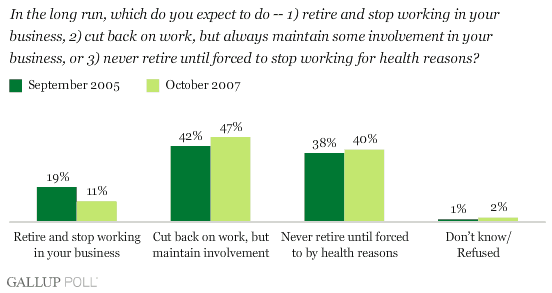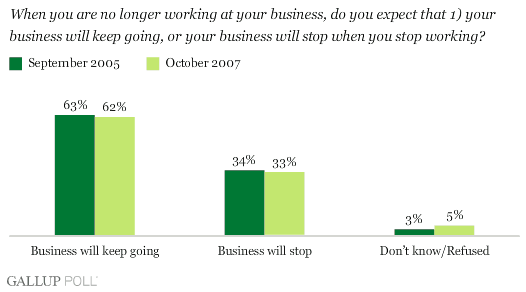Most Small-Business Owners Don't Plan to "Fully" Retire
Here's a relatively recent article I found from Gallup that goes back to my point that if you are doing what you love, you won't WANT to retire!
Source: http://www.gallup.com/poll/104866/Four-SmallBusiness-Owners-Dont-Plan-Retire.aspx
PRINCETON, NJ -- Only 11% of small-business owners say they plan to retire and stop working in their businesses in the long run, according to the Wells Fargo/Gallup Small Business Index survey.

Declining and Delaying Retirement
Nine in 10 small-business owners say they are satisfied with being small-business owners -- 21% are extremely satisfied, 37% very satisfied, and 31% somewhat satisfied. Perhaps most indicative of their contentment, 83% say they would do it again and become small-business owners instead of doing something else. In other words, small-business owners overwhelmingly like what they do.
Because small-business owners like their work and have the option to continue working past retirement, it may not be surprising that 40% say they will continue to work as long as their health allows them to do so -- essentially the same as the 38% who felt this way in 2005. Another 47% say they eventually plan to cut back on the work they do but maintain their involvement in their businesses -- up from 42% in 2005. The percentage of small-business owners actually planning to retire and stop working in their businesses fell from 19% in 2005 to 11% in the most recent survey.
Thirty-eight percent of small-business owners say they will retire or cut back on their work at a different time than they had originally planned. Six in 10 of these owners say they will retire later than planned and many of those delaying retirement will do so for financial reasons. Sixty-two percent of small-business owners say they expect their small businesses to keep going after they stop working, while one in three feel their businesses will stop -- essentially the same as in 2005.

A Good Time to Have Retirement Flexibility
An April 2007 Gallup Poll showed that only 53% of Americans thought they would have enough money to live comfortably when they retire. Obviously, current economic conditions are even less conducive to retirement than they were last year, given declining housing prices, a weak stock market, low interest rates on most safe forms of savings and investment, and surging food and energy prices. As a result, it is not surprising that earlier this year, 45% of Americans said they were worried that they would have to retire at a later age than they had originally planned.
In the Wells Fargo/Gallup Small Business Index survey of last October, a much higher 79% of small-business owners said they thought they would have enough money to live comfortably in retirement. In part, this may be because small-business owners tend to have higher incomes than the average American. More importantly, however, small-business owners also have more flexibility than the average American in deciding whether and when they will retire.
This ability to time one's retirement may be of even more importance in the months ahead. Last Friday's Bureau of Labor Statistics report showing another drop in U.S. jobs makes it obvious that the U.S. economy is now experiencing a recession. During such an economic downturn, many companies lay off employees and encourage early retirement as their business slows. As a result, many Americans may soon be more worried -- not that they will have to work to a later age than they had hoped, but that they will have to retire earlier than they desire and with far fewer resources than they had hoped.
Survey Methods
Results for the total dataset are based on telephone interviews with 600 small-business owners, conducted Oct. 4-14, 2007. For results based on the total sample of small-business owners, one can say with 95% confidence that the maximum margin of sampling error is ± 4 percentage points. The margins of error for subgroups will be slightly larger.
Other results are based on telephone interviews with 1,008 national adults, conducted April 2-5, 2007. For results based on this sample, the maximum margin of sampling error is ±3 percentage points.
In addition to sampling error, question wording and practical difficulties in conducting surveys can introduce error or bias into the findings of public opinion polls.






Post a Comment